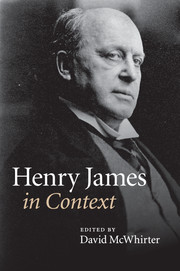Book contents
- Frontmatter
- Contents
- List of Illustrations
- Notes on Contributors
- Preface
- Abbreviations
- Chronology
- Part One Life and career, times and places
- Part Two Historical and cultural contexts
- Chapter 9 Aestheticism and Decadence
- Chapter 10 Authorship
- Chapter 11 Children
- Chapter 12 Consumer culture
- Chapter 13 Cosmopolitanism
- Chapter 14 Courtship, marriage, family
- Chapter 15 Ethics
- Chapter 16 Language
- Chapter 17 Law
- Chapter 18 Manners
- Chapter 19 Media and communication technologies
- Chapter 20 Modernism
- Chapter 21 Money and class
- Chapter 22 Museums and exhibitions
- Chapter 23 Nationalism and imperialism
- Chapter 24 Print culture
- Chapter 25 Psychology
- Chapter 26 Race
- Chapter 27 Realism and naturalism
- Chapter 28 Sexualities and sexology
- Chapter 29 Social sciences and the disciplines
- Chapter 30 Things
- Chapter 31 Time
- Chapter 32 Travel and tourism
- Chapter 33 Urbanity
- Chapter 34 Visual culture
- Chapter 35 Women and men
- Chapter 36 Work
- Part Three Reception
- Further reading
- Index
- References
Chapter 35 - Women and men
Published online by Cambridge University Press: 05 August 2014
- Frontmatter
- Contents
- List of Illustrations
- Notes on Contributors
- Preface
- Abbreviations
- Chronology
- Part One Life and career, times and places
- Part Two Historical and cultural contexts
- Chapter 9 Aestheticism and Decadence
- Chapter 10 Authorship
- Chapter 11 Children
- Chapter 12 Consumer culture
- Chapter 13 Cosmopolitanism
- Chapter 14 Courtship, marriage, family
- Chapter 15 Ethics
- Chapter 16 Language
- Chapter 17 Law
- Chapter 18 Manners
- Chapter 19 Media and communication technologies
- Chapter 20 Modernism
- Chapter 21 Money and class
- Chapter 22 Museums and exhibitions
- Chapter 23 Nationalism and imperialism
- Chapter 24 Print culture
- Chapter 25 Psychology
- Chapter 26 Race
- Chapter 27 Realism and naturalism
- Chapter 28 Sexualities and sexology
- Chapter 29 Social sciences and the disciplines
- Chapter 30 Things
- Chapter 31 Time
- Chapter 32 Travel and tourism
- Chapter 33 Urbanity
- Chapter 34 Visual culture
- Chapter 35 Women and men
- Chapter 36 Work
- Part Three Reception
- Further reading
- Index
- References
Summary
On 10 April 1899 the then governor of New York, Theodore Roosevelt, delivered a famous speech on ‘The Strenuous Life’, where he described the requirements for the well-being of the nation:
In the last analysis a healthy state can exist only when the men and women who make it up lead clean, vigorous, healthy lives . . . The man must be glad to do a man’s work, to dare and endure and to labor; to keep himself, and to keep those dependent upon him. The woman must be the housewife, the helpmeet of the homemaker, the wise and fearless mother of many healthy children.
Eleven years later, in an address on ‘Citizenship and the Republic’ delivered at the Sorbonne on 23 April 1910 – the famous speech on ‘the man in the arena’ as against the paltry ‘man of lettered leisure’ – he would synthetically define the ‘ordinary, every-day qualities’ needed to build up a great nation in much the same terms: ‘the will and the power to work, to fight at need, and to have plenty of healthy children’.
During his two terms as President of the United States, from 1901 to 1909, Theodore Roosevelt would again and again rehearse these basic lessons, probably doing more than any US president before or after to shape the nation along clearly defined gender lines. The normative masculine and feminine roles that he lastingly and effectively engraved in the national ideology were those consecrated by the notion of the ‘separate spheres’: the social distinction of the public, economic and political realm reserved for men and the private, affective and moral domain inhabited by women, which had been developing all along the nineteenth century, sanctioned in public discourse although not necessarily an accurate description of fact. Roosevelt’s circulation of this ideological model from his presidential pulpit was the United States’ equivalent of the rise to hegemony of the bourgeois domestic ideology in mid-nineteenth-century England, with its exemplary pedagogical function and its entanglements with the ideology of the empire. Like Queen Victoria’s before him, Roosevelt’s agenda was an explicitly nationalistic and implicitly middle-class one: what his recipe for family health was trying to build up was a peculiarly agonistic version of the middle-class ethos as the backbone of the American nation and the foundation of its imperial mission.
- Type
- Chapter
- Information
- Henry James in Context , pp. 378 - 388Publisher: Cambridge University PressPrint publication year: 2010



